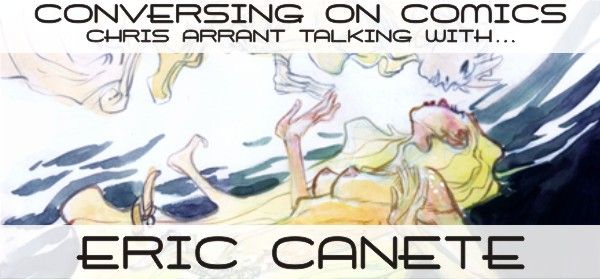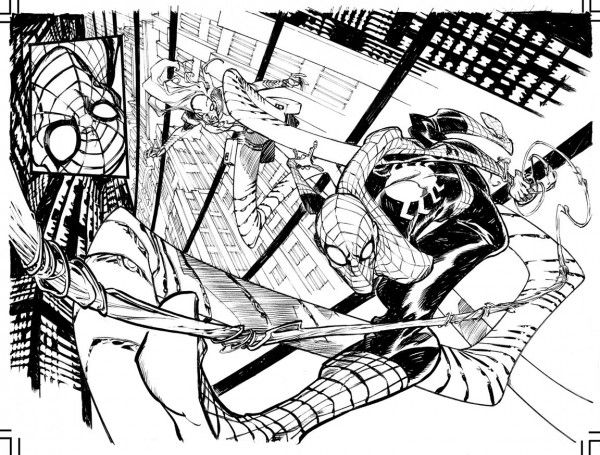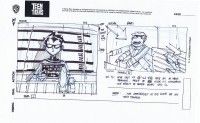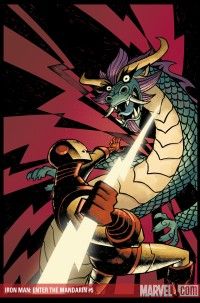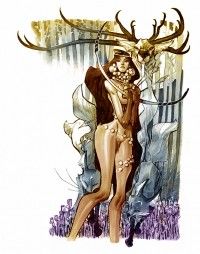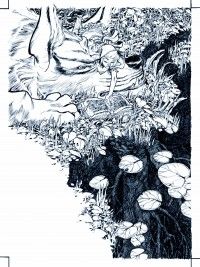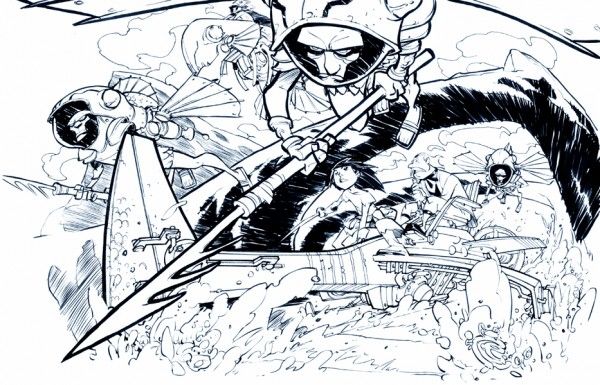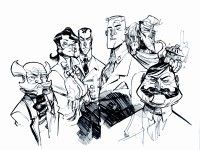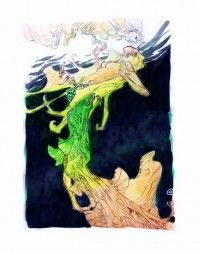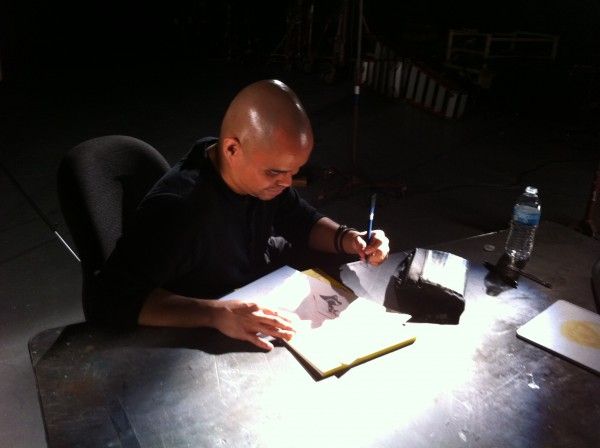Most any professional comic artist is able to produce work that looks like comic art; that's their job. But there's a select few who can produce work that looks like fine art. Artist Eric Canete has been doing it for almost two decades now, from his start at the racy publisher Verotik owned by Glenn Danzig and on to work at Wildstorm, Marvel and the independent arena. While Canete has made a significant name in comics with his work on Iron Man: Enter The Mandarin and The End League, comics isn't his only career; he balances it with a thriving career as a storyboard artist for animation, sometimes working exclusively in animation for a period of months (or even years), and then sometimes returning to comics for a time like he never left.
I reached out to Canete for this interview because, frankly, I missed seeing new comics from him. I was aware he had a career in animation, but after being spoiled with the caliber of his work and successfully tracking down most of his early, hard-to-find comics, I wanted more. I'd interviewed Eric on previous occasions, and he exceeded my expectations about how upfront he would be about the waxing and waning of his comics work. He's now involved with the upcoming DC animated series Beware the Batman after finishing up TRON Uprising, and I discovered Canete had a graphic novel released this year. And if that wasn't enough, Canete considers it the apex of his career so far. Unfortunately, however, it's not available in America -- or even in English.
Chris Arrant: What are you working on today, Eric?
Eric Canete: Today, I'm working on storyboards for Warner Bros. upcoming show, Beware the Batman. I'm also trying to get caught up with past-due illustration commissions I've taken at the various conventions I've done throughout the year. I'm terribly behind.
People here know you from comics work, and probably don’t know about your animation work. Can you tell us what show you’re working on now, and what aspect of the art you do for the show?
It's funny that you mention that since in my career, I've actually done more animated-related works than I have in comics. But people seem to know a lot more about my comic book work. It's probably the nature of the business -- my credit in animation flashes by on-screen in less than half a second. Whereas in comics, readers can actually see and read the credits page.
As far as what I've been doing -- a few months back, I finished doing storyboards for Disney's TRON Uprising. It's the most gorgeous show I've ever been involved with -- both in production/art designs, to the directors who I've had the opportunity to work with. I'm very proud to be associated to the show.
Currently, I'm doing pre-production storyboard work for Beware the Batman for Warner Bros. Animation. The guys here are really doing everything they can to make sure this has the polish that Batman fans have come to expect.
I can rattle off your big moments in comics, but as you say animation is a more anonymous field. Can you point out some specific things you've done in animation you're particularly proud of?
There's a sequence I've put online from Teen Titans: Trouble in Tokyo -- a DVD-released movie from Warner Bros. People can see a side-by-side comparison of what I did as a storyboard artist and what made the final cut in the film.
The storyboards I've done for TRON Uprising are my most recent pride and joy. The episodes themselves have yet to air, but it's this set that I'm most thrilled about -- mostly because of the atmosphere and culture that my directors at Disney were trying to cultivate. They pushed for full creative freedom each and every time we went to work. Between Charlie Bean and Robert Valley and Alberto Mielgo, everyone really wanted to up their game which made it one of the most wonderful experiences I'd ever been part of.
My affinity for TRON, the people I worked with and the scripts we were all working on -- the joy of that, made its way into the storyboards. It was a lot of fun and more importantly it never ever felt like work.
As someone who splits his time in animation and comics, how do people who work strictly in the animation industry feel about comics, as fans and as a potential place to do work like you have?
I'm under the impression that, for the most part, there's a lot of respect from both sides of the table. I think that animation guys know how hard it is to be a sequential artist and vice versa. I have friends who work in both industries and they're always amazed at each other's responsibilities when it comes to their jobs. I do hear this a lot from animation/storyboard folk: "I don't know how you comic book guys do it. That just looks like a TON of work!" What they don't realize is that there's just as much work on their tables, too; it's just focused on something else that's more job specific.
As far as crossing over, from animation to comics, I always encourage the endeavor. I believe, from personal experience, that the transition from being a storyboard artist and getting into panel to panel work is significantly easier than teaching a guy who's only done comic book pages and have them do storyboards. It's just the worst learning curve ever. So whenever I'm talking to a friend or a co-worker in animation who wants to have a go at doing a comic book, I always mention that it's already in their drawing DNA to do the stuff comic book guys do. The difficult part is just being more specific about which shots to draw and picking out those "illustration moments" which those are the images that comic book artists have grown up looking at and have regurgitated over and over again.
You seem to bounce back and forth from comics to animation; since your last major comic series New Avengers: Luke Cage in 2010, you’ve worked on the TV series G.I. Joe: Renegades, the movie Batman: Year One and now the upcoming Beware the Batman. You did the same from 2002 to 2005, doing storyboard work for the DC Animated stuff at the time. How would you describe your career and shifting back and forth?
Initially, earlier in my professional career, I would say that bouncing back and forth was out of necessity. I simply could not get enough solid, back-to-back comic book work to maintain a respectable annual income. So I would go back to animation because I was lucky enough that I had friends who worked on different productions. They would give me a heads-up any time there was available freelance or in-house animation positions available.
These days, I'm keeping myself busy with primarily animation-related projects and I try my best to never jump onto a comic book project simply for the sake of doing one. You mentioned New Avengers: Luke Cage -- and that's a perfect example. I did Cage because my editor, Tom Brennan, had called me and thought I could do well with the book. But the more important part is that I like Tom, and I consider him a friend. And that pretty much sums up my attitude towards working in comics at present: Whether in comics or animation, I try to only work on projects with friends.
As it stands, I have zero interest in contributing to the current cannon of mainstream heroes being published. But if I work for and with someone who I consider to be a buddy of mine, I can always convince myself that I need to do my best for them because we're friendly and that I'd hate to let them down.
If you think about the projects I've done in semi-recent times -- NYC Mech with Ivan Brandon, Iron Man: Enter The Mandarin with Joe Casey, The End League with Rick Remender, Ben 10: Alien Force with Glen Murakami, Amazing Spider-Man with Joe Kelly and editor Stephen Wacker, Fire Breather with Peter Chung, Batman: Year One with Sam Liu -- I consider all of those gentlemen as friends of mine.
I'm very fortunate and very thankful that I've now the opportunity the pick and choose.
You're spoken a bit about this, but let me ask you directly: What prompts the rotation from comics to animation and back to comics again?
If it has to be one thing, I'd say it was my overall interest in the project. I know myself enough to say that I'm generally a horrible employee. And if the project doesn't interest me at all, and that I'm simply doing it for the money, then 1) I know my mental investment, my focus in this thing I'm supposed to be giving my all to is going to be pretty low or is going to be short-lived, and 2) I'd feel guilty for taking the money their paying me if I'm not able to contribute my best.
So, I'd rather be interested right from the get-go. Sometimes it's comics. Often times, it's animation.
Earlier this year you released your first high-end art book, Encore, with a very successful Kickstarter drive to kick it off. Is this book still available for people that want it?
Yes, thanks for mentioning it. As you said, the book is called Encore. The book contains about five years worth of images that have been posted on my blog, along with some concept design work and some color work.
Funny story about that experience. When my art agent Jason Schachter told me that the Kickstarter for it had gone live and we had 30 days to raise the money needed in order to print it overseas, I really believed we would need all thirty days so that I can go and whore myself in as many social media outlets as possible. I was operating under the impression that since I'm not really involved in any mainstream projects that was getting any sort of spot light, that I was going to really have to yell as loud as I could in order to have people look in the direction of this crowd funding event.
We met our pledge goal in about four days. I was shocked.
/p>
More than that, I was so very grateful for all the kind people who got the word out and who passed the link around to those who they believed may have been interested. I'm grateful to the folks who gave their generous recommendations about my work (both pros and fans alike), and to the online media coverage we got which contributed in raising awareness for it. Most importantly I'm indebted to all kind folks who gave monies to fund the project and helped get the book made.
If there's anyone out there interested in purchasing a copy for themselves, you can go directly to www.essentialsequential.com, click the "Books" tab and it should be easy to find from there. We only printed a limited amount of copies and it's gotten great word of mouth from the people who have bought it. I'm so very proud of it and I hope everyone who wants one can get a copy for themselves if supplies permit.
Even though you’re not doing comics actively now (that we know of), you’re still doing quite a number of commissions and conventions. Most animators don’t really have a public face unfortunately, so whats it like to be able to go out and meet fans and get commission work on the side since you built up your name in comics?
It's quite a unique position, for sure. I got my start in comics, built a career as an illustrator in comics and drew comics related material when posting images to my blog. So I guess I've somewhat cultivated a culture at these conventions that thinks I'm a comic book guy? I don't know.
As an artist working in animation, it is as you've said - typically we don't have much of a public face. But I think that's slowly changing for the better. There are venues now where artists that do pre-production animation work for the large and small screens are getting their proper due and time under the spotlight. CTN Animation Expo, an annual expo in Burbank, is doing a lot to help change that 'lack of a public face' perception for the better.
And as for being able to do commissions at comic book shows, I'm going to just hope that's due to the fact that people like my work and that it means something to them to get an original piece from me whether or not it's comic book related. I'd hope that it's because they like the imagination and creativity I try to bring whenever they ask me to draw something for them. I really have been very fortunate. I've a very loyal fan base and I can't believe they attention they give me - again, because I haven't done that much comic book work to speak of in recent times.
Speaking of commissions, this year you decided to stop doing commissions of copyrighted/trademark characters. Can you talk about why you decided to go that route?
I had an extended entry about his on my blog, but the long and short of it was that I was no longer having any fun while I was drawing all of those copyrighted/trademarked characters. The polish and glitter of being able to draw characters whom I had grown up with didn't present the same set of challenges as they once did when I first opened my blog. I just wasn't feeling the excitement of giving the audience something new because -- well, to be quite honest -- it wasn't new to me anymore.
But the most important point that really straightened me out was that people were paying their hard earned money in order for me to draw something for them and I didn't feel that it was right to collect that money if I wasn't delivering something that I was creatively invested in. So rather than not give them my best, I opted to not do commissions based on mainstream characters -- essentially, other companies' IPs. Instead, I wanted to draw something that I could really get into. The only nerve wracking part is that I wasn't sure the response to the venture was going to be a successful one.
Now, almost seven-plus months later, I'm glad to see that people are still interested in having me do something for them. It's still slow going and I haven't been making the sort of numbers that I'd been doing since the policy change, but that's okay with me. This experience just helps strengthens the resolve of my theory that people want my art because it's my work and not simply because I'm drawing Batman or Spider-Man.
Let me also say that, I don't look down at anyone who draws those licensed characters as commissions at conventions. Just, for me ... I was done with all of that for now.
Several months into this, the results you’ve posted online are great.. they really seem to push your creativity, with you essentially creating new characters with every commissions. What’s that been like for you?
Thanks for saying so. The whole point of the exercise was to keep myself challenged while doing the commissions. As you said, the new policy really allows me to try and push myself creatively. In my mind after I see the finalized image, I don't have a fair gauge on whether or not I've succeeded. I mean, it's the first time I've drawn that ... thing, you know? So I can never tell if it's good or not. But I'm very fortunate that after receiving them, the people who asked for the commissions are reacting so positively to what I've done.
For me, the most fascinating part of the whole experience is watching the people's faces when they first learn that I've sort of changed things up. When Jason Schachter takes a commission request (and if the potential client hasn't heard of my new policy yet), he has to tell them the ABC's of it all -- that I don't do mainstream stuff anymore, my reasons behind it, and so on. So for a brief second they have this disappointed reaction. Then Jay gets to the part when he says, "BUT ... even though Eric's not doing trademarked/copyrighted Character X, Y, & Z, what he's willing to do is do something in the spirit of those characters."
It's at that point that I can tell whether or not they're really interested in getting an original piece of art from me. That's when I can see them light up at the potential, or cordially decline and go on their merry way. My theory on it is this: ANYONE in that convention can deliver a competent Superman or Batman or Wolverine drawing. That's almost standard fare and there are a ton of talented artists in Artists Alley who are capable of doing it. But I think the idea that I'm giving them something unique, something that no one else can have, and especially after hearing the story that I don't want to just crap something out for the sake of taking their money -- that possibility or the idea of that -- it intrigues them. It's very cool to be witness it up close.
What really helps is that the more of the delivered images I post online, the better the reactions and support for them have been at the shows. I think that when we first started trying to change the culture as to how others saw my work by changing what I was willing to do and not do, people were really nervous because they didn't have ... I don't know ... like a "proof of concept"? They didn't really know what they were getting themselves into. But now, it's sort of neat to hear them go, "Oh, man, I was on your blog and I saw that warrior woman with the sword and face tattoos. Blew my mind! I want something like that, but I'll leave it up to you to come up with it." Or, "I've got a Cyborg (from Teen Titans) themed sketchbook, but I'd love to see your take on it with your style and shit -- without making it Cyborg."
So, yeah ... it's building up some decent momentum, and it's all very flattering and encouraging.
You’ve been a part of creator-owned projects before, but I can’t remember one where you got to create the characters. In doing all these new characters for commissions, have you thought about doing your own book?
Yes, of course. And I wish I had a cloning machine so I could task my body copy to do all the things I want to do on the creator-owned comic book end. I'm sure my writing partner Jonathan Tsuei wouldn't mind that clone either. I've been promising him that I'd finish our project since the first time we pitched it. My 9 to 5 storyboarding work just takes up SO much of my time that to do something outside of that really has to be planned out months in advance.
I'm horrible when it comes to staying on schedule. It's something I seriously need to remedy.
I heard some unconfirmed rumors that at one time you were doing a book at either Dark Horse or some European publisher. Am I totally off the mark on that, or is there some truth to it?
The last thing I did at Dark Horse was a few fill-in pages for their House of Night book. And that was a disaster. I just did not dedicate enough of my time to that project so that everyone would be happy with me -- and it was just eight pages or something! I really am a horrid employee. My editor, Sierra Hahn (bless that woman for dealing with a jerk like me), did all that she could to help me and I was still deficient. I'm very grateful for that opportunity, but I really regret messing that up.
The hardcover album that was published in Europe is a book called 7 Detectives. I believe it's the shining star in my body of work thus far. I am truly proud of how it all came together -- from colors ( I was lucky to get a rockstar in Simon Lou-Canthelou to turn my chicken scratches into something that looked and felt cohesive enough to print), to letters, to final presentation -- it's really something I that I gush about. I want to show a copy to everyone and say, "See?! Look! I've been drawing comics!" Then they ask me if there's a version translated to English and I have to walk away deflated. [laughs]
On that project I was very up front with my editor David Chauvel about my schedule -- that I'm slow, I've a ton of things on my plate at any given time, and that I'm working on my own projects simultaneously so I wouldn't be able to deliver pages with any sort of decent frequency. They didn't even bat an eye -- I guess they were used to that slower sort of pace. The book took me a year and a half to draw, and after all was said and done I can say I loved my experience doing that title and I love the way the book turned out. Everyone should really check it out if they get the chance.
Jumping back, I wanted to talk about the closure of the most recent chapter of your comics career. You came back with Iron Man: Enter The Mandarin and then The End League, went back Marvel and then even covers for the first three issues of the New 52 Superboy. Your last major work was a great short in The Rocketeer Adventures, but then nothing. How come we don’t see more work by you on comic shelves these days?
I've already referred to myself as being a horrible employee, right? I'm slow, I embarrass myself whenever there's a deadline, and the style of my art doesn't fit in with the current status quo. I truly am unemployable!
I beg to differ on that, Eric.
Jokes aside, that's probably only part of the the reason. But earlier I've also mentioned the true reason, at least from my end, as to why I get involved with comic books in the first place: My friends.
In the titles that you mentioned in your question -- Iron Man, The End League, Marvel covers and Superboy -- I can directly attribute my participation in those projects based on who's involved with them. Iron Man was something Joe Casey was kind enough to ask me to do, The End League was with Rick Remender, the Marvel stuff was for Tom Brennan and the Superboy work was for Mark Chiarello. Even my work on Rocketeer was through Scott Dunbier. I like working with and for my friends -- at the very least, people who I'm friendly with. I think it keeps me invested because I do my very best to try and not let them down. Otherwise, I can't find myself investing any sort of passion or energy on mainstream work. It just holds no interest for me.
The more cynical observer would probably argue that the only way I'd get employment in comics is if my friends hire me because ... well, I'm a horrible employee. And they're probably right.
I could argue with you ther, but let's move forward. Flipping through your work, I first found you through the Cybernary OGN you did with Joe Casey. But you did a whole host of work back in the 90s for Glenn Danzig’s Verotik line, which is out of print and something most people don’t know about. Is there any chance we’ll ever see that back in print, or would you even support seeing such older work of yours come out?
Right. Glenn was a fun guy to do art for. He was just as excitable as any fan I've run into and he was one of the first people who saw enough potential with my work to actually give me a job drawing comics. And, yes, the stuff was really risque at the time and definitely aimed towards a more mature audience. Initially, when I was doing more mainstream work, I was a bit embarrassed of those Verotik issues because I thought those books were something to be ashamed of. Now that I'm older, I'm just very grateful that people bought them. When they bring one of those issues for me to sign I think, "Someone bought this book. They paid their money to buy this and now they're gracious enough to ask for my signature. That's pretty cool."
These days, I'm not embarrassed by my older work. It takes way too much effort to be embarrassed about it. It's old work, you know? For it's time, I was happy drawing that way. I did a lot of exploring and experimenting and I was getting paid to do it. That was a pretty exciting time for me and I look back at a lot of it very fondly. More importantly, it allowed for people to connect with me via my artwork. I think that's a pretty decent job well done.
Dream scenario here, but is there something in comics that you’d come back for if it was offered to you? Perhaps a certain character, working with a certain creator, or maybe the right opportunity to do a creator-owned book?
I used to have aspirations of drawing the X-Men because I grew up reading that stuff. I'd think, "Man, I'd love to draw the stories of the X-Men as Paul Smith, or as Jim Lee drew them." But then I realized there's no way I could draw those issues better than those guys did. I just really loved that whole experience of reading the great stories and looking at the great art. After that, there was a long drought that fed into my disinterest in anything X-Men-related. Then Remender did Uncanny X-Force with Jerome Opeña and Dean White, and those books just blew my mind. I was a lunatic for anything those guys touched. Brilliant, brilliant work. That sort of got me interested again in wanting to draw those books, only to remember how I felt with Smith and Lee -- I can't draw that issue/those books any better than Jerome did. It just felt amazing being an excited, involved and immersed fan again.
So, I don't know. Every time something mainstream comes up that I'd like to work on, someone is obviously already doing it better than anything that I could do. And that's the way I think it should be. But I loved working with Rick. I love the stories that he told when he and I were working on The End League. So maybe there's something in the future for that. I really like how Ivan Brandon and I work: simple, open and organic. If I had a five year plan and made a list on what to make good on in that time, working with those guys would definitely be high on that list.

